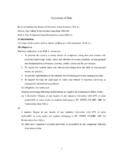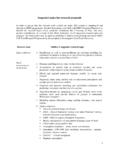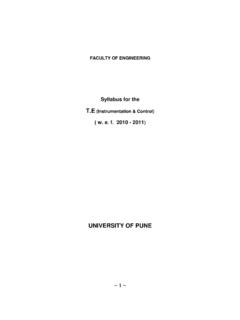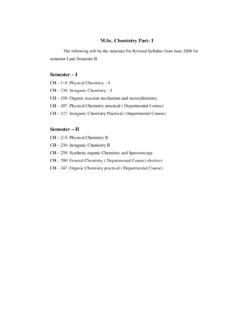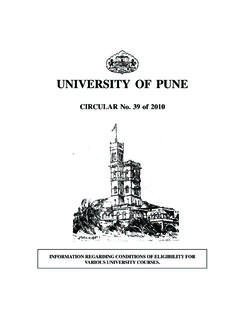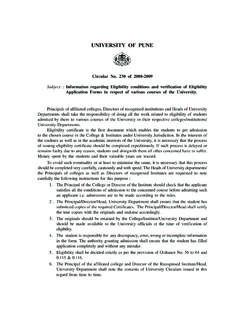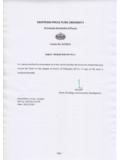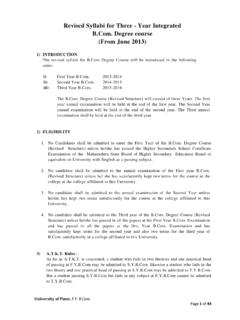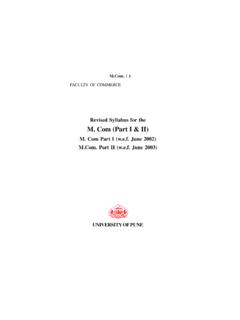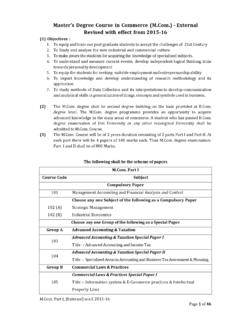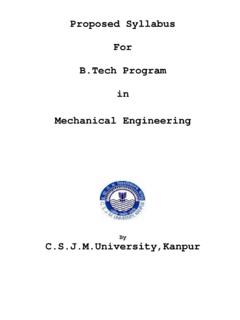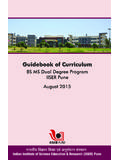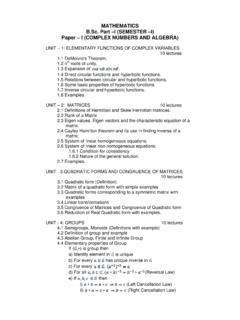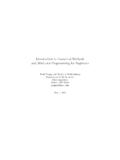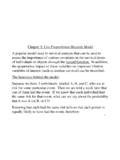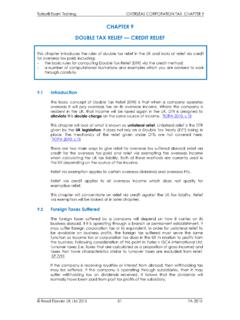Transcription of Savitribai Phule Pune University Three Year Degree …
1 Savitribai Phule pune University Three year Degree course in B. Sc. Computer Science 1) Title of the course : B. Sc. Computer Science T. Y. B. Sc. Computer Science Syllabus in the Subject Computer Science (To be implemented from Academic year 2015-16) 2) Preamble: B. Sc. Computer Science is a systematically designed Three year course that prepares the student for a career in Software Industry. The syllabus of Computer Science subject along with that of the Three allied subjects (Mathematics, Electronics and Statistics) forms the required basics for pursuing higher studies in Computer Science. The Syllabus also develops requisite professional skills and problem solving abilities for pursuing a career in Software Industry. 3) Introduction: At first year of under-graduation basic foundation of two important skills required for software development is laid. A course in programming and a course in database fundamentals forms the preliminary skill set for solving computational problems.
2 Simultaneously two practical courses are designed to supplement the theoretical training. The second practical course also includes a preliminary preparation for website designing in the form of HTML programming. Along with Computer Science two theories and one practical course each in Statistics, Mathematics and Electronics help in building a strong foundation. At second year under-graduation: The programming skills are further strengthened by a course in Data structures and Object oriented programming. The advanced topics in Databases and preliminary software engineering form the second course . Two practical courses alongside help in hands-on training. Students also undertake a mini project using software engineering principles to solve a real world problem. Simultaneously two theories and one practical course each in Mathematics and Electronics help in strengthening problem solving abilities.
3 At third year under-graduation: Six theory papers in each semester and practical courses cover the entire spectrum of topics necessary to build knowledge base and requisite skill set. Third practical course also includes project work which gives students hands on experience in solving a real world problem. Objectives: To develop problem solving abilities using a computer To build the necessary skill set and analytical abilities for developing computer based solutions for real life problems. To imbibe quality software development practices. To create awareness about process and product standards To train students in professional skills related to Software Industry. To prepare necessary knowledge base for research and development in Computer Science To help students build-up a successful career in Computer Science 4) Eligibility: Higher Secondary School Certificate (10+2) Science with Mathematics or its equivalent Examination as per Savitribai Phule pune University eligibility norms.
4 Note: Admissions will be given as per the selection procedure / policies adopted by the respective college, in accordance with conditions laid down by Savitribai Phule pune University . Reservation and relaxation will be as per the Government rules. 5 A) Examination Pattern: First year B. Sc. Computer Science Subject : Computer Science Pattern of Examination: Annual for both Theory and Practical Courses * Subject to compulsory passing in external examination and getting minimum 40 marks out of 100 Notes: 1. Total marks: Theory (100 + 100 ) = 200 marks 2. Total marks per year 200 (Theory) + 100 marks (practical)+ Grade(practical) = 300 marks +Grade 3. Internal marks for theory papers given on the basis of internal assessment tests and for practicals on continuous assessment of lab work. 4. In case of Computer Science Practical Paper II, marks out of 100 will be converted to grades Marks Grade 75 And Above O 65 And Above A 55 and above B 50 And above C 45 And Above D 40 And Above E Below 40 ( indicates Failure) F Theory examination will be of Three hours duration for each theory course .
5 There shall be 5 questions each carrying equal marks. The pattern of question papers shall be: Question 1 8 sub-questions, each of 2 marks; answerable in 2 -3 lines and based on entire syllabus Question 2, 3 ,4 and 5 4 out of 5/6 short answer type questions; answerable in 8 10 lines mix of theory and problems Internal examination: Internal assessment of the student by respective teacher will be based on written test, 10 marks each term. The written test shall comprise of objective type questions Multiple Type Questions, True / False, Definitions, Answer in Two or Three line question (Describe/Explain).There shall be 20 questions. Practical: Continuous assessment of Lab work and mini project. Practical Examination: Practical examination shall be conducted by the respective college at the end of the academic year . Practical examination will be of 3 hours duration for each practical course .
6 Certified journal is compulsory to appear for practical examination. There shall be two expert and two examiners per batch for the practical examination. Second year B. Sc. (Computer Science) Subject : Computer Science No Paper Title: Semester I Title: Semester II 1 Computer Science Paper I CS-211:Data Structures using C CS-221:Object Oriented Concepts using C++ 2 Computer Science Paper II CS-212: Relational Database Management System CS-222:Software Engineering 3 Computer Science Paper III CS-223:Data structures Practicals and C++ Practicals 4 Computer Science Paper IV CS-224:Database Practicals & Mini Project using Software Engineering techniques Pattern of examination: Semester Theory courses (Sem I: CS-211 and CS212): Semester (Sem II: CS-221 and CS-222): Semester Practical course (CS-223 and CS-224): Annual Paper/ course No. Title Total Number of Lectures/Practicals Per Week Standard Of Passing Internal marks out of 10 (theory) Out of 20 (practicals) External marks out of 40 (theory) Out of 80 (practicals) Total passing marks out of 50 (theory) and out of 100 (practicals) Theory Paper I (CS-211) Data Structures using C Four Lectures/per Week (Total 48 per Semester) 04 16 20* Theory Paper II (CS-212) Relational Database Managem ent System Four Lectures/per Week (Total 48 per Semester) 04 16 20* Theory Paper I (CS-221) Object Oriented Concepts using C++ Four Lectures/per Week (Total 48 per Semester) 04 16 20* Theory Paper II (CS-222) Software Engineeri ng Four Lectures/per Week (Total 48 per Semester) 04 16 20* Practical paper I (CS 223) (First & Second Semester) Data structures Practicals and C++ Practicals Practicals of 4 lectures each 25 practicals / year ) 08 32 40* Practical paper II (CS 224) (First & Second Semester)
7 Database Practicals & Mini Project using Software Engineeri ng technique s Practicals of 4 lectures each 25 practicals / year ) 08 32 40** * Subject to compulsory passing in external examination and getting minimum 20 marks out of 50 ** Subject to compulsory passing in external examination and getting minimum 40 marks out of 100 Notes: 1. Total marks: Theory for each semester (50 + 50 ) = 100 marks 2. Total marks per year 200 (Theory) + 100 marks (practicals)+Grade(practical) = 300 marks+Grade 3. Internal marks for theory papers given on the basis of Continuous internal Assessment Theory examination will be of two hours duration for each theory course . There shall be 4 questions carrying equal marks. The pattern of question papers shall be: Question 1 10 sub-questions, each of 1 mark; answerable in 2 -3 lines and based on entire syllabus 10 Marks Question 2, 3 Sub-questions carrying 5 marks (2 out of 3) 10 Marks Question 4 Sub-questions carrying marks depending on their complexity with options 10 Marks Internal examination: Internal assessment of the student by respective teacher will be based on written test, 10 marks each Semester.
8 The written test shall comprise of objective type questions Multiple Type Questions, True / False, Definitions, Answer in Two or Three line question (Describe/Explain) There shall be 20 questions. Practicals: Continuous assessment of practical performance Practical Examination: Practical examination shall be conducted at the respective college at the end of the academic year . Practical examination will be of 3 hours duration. Continuous assessment of practical performance should be using a Lab Book specifically designed for the purpose. Certified Lab book is compulsory to appear for practical examination. There is no need of attaching program printouts to the Lab Book. There shall be two experts and two examiners per batch for the practical examination. One of the examiners will be external. Third year B. Sc. (Computer Science) Pattern of examination: Semester Theory courses: (Sem III: CS-331-CS-336): Semester (Sem IV: CS-341-CS-346): Semester Practical course : (CS-347-CS-349): Annual Theory Papers Paper/ course No.
9 Title Total Number of Lectures/Practicals Per Week Standard Of Passing Internal marks out of 10 (theory) Out of 20 (practicals) External marks out of 40 (theory) Out of 80 (practicals) Total passing marks out of 50 (theory) and out of 100 (practicals) SEM III Theory Paper I (CS-331) System Programmin g 48 04 16 20* Theory Paper II (CS-332) Theoretical Computer Science 48 04 16 20* Theory Paper III (CS-333) Computer Networks-I 48 04 16 20* Theory Paper IV (CS-334) Internet Programming I 48 04 16 20* Theory Paper V (CS-335) Programmin g in Java-I 48 04 16 20* Theory Paper V (CS-336) Object Oriented Software Engineering 48 04 16 20* SEM IV Theory Paper I (CS-341) Operating System 48 04 16 20* Theory Paper II (CS-342) Compiler Construction 48 04 16 20* Theory Paper III (CS-343) Computer Networks-II 48 04 16 20* Theory Paper IV (CS-344) Internet Programming II 48 04 16 20* Theory Paper V Programmin (CS-345) g in Java-II 48 04 16 20* Theory Paper V (CS-346) Computer Graphics 48 04 16 20* Practical Papers Practical paper I CS 347 (Semester III & IV) Practicals Based on CS-331 and CS-341 Sem I & Sem II Practicals of 4 lectures each 25 practicals / year ) 08 32 40** Practical paper II CS 348 (Semester III & IV) CS- 348:Practicals Based on CS-335 and CS-345 Sem I & Sem II and Computer Graphics using OpenGL Practicals of 4 lectures each 25 practicals / year ) 08 32 40** Practical paper I CS 349 (Semester III & IV) CS- 349.
10 Practic als Based on CS-334 and CS-344 Sem I & Sem II and Project Practicals of 4 lectures each 25 practicals / year ) 08 32 40** * Subject to compulsory passing in external examination and getting minimum 20 marks out of 50 ** Subject to compulsory passing in external examination and getting minimum 40 marks out of 100 Notes: 1. Total marks: Theory for each semester (50 x 6 ) = 300 marks 2. Total marks per year 600 (Theory) + 300 marks (practicals) = 900 marks 3. Internal marks for theory papers given on the basis of continuous internal assessment Theory examination will be of two hours duration for each theory course . There shall be 4 questions carrying equal marks. The pattern of question papers shall be: Theory examination will be of two hours duration for each theory course . There shall be 4 questions carrying equal marks. The pattern of question papers shall be: Question 1 10 sub-questions, each of 1 mark; answerable in 2 -3 lines and based on entire syllabus 10 Marks Question 2, 3 Sub-questions carrying 5 marks (2 out of 3) 10 Marks Question 4 Sub-questions carrying marks depending on their complexity with options 10 Marks Internal examination: Internal assessment of the student by respective teacher will be based on written test, 10 marks each Semester.
